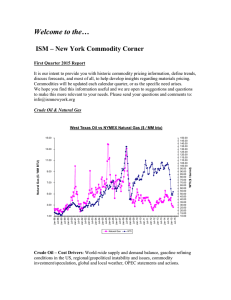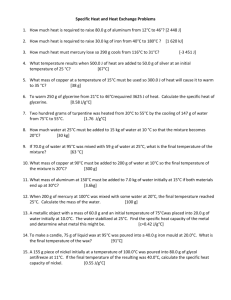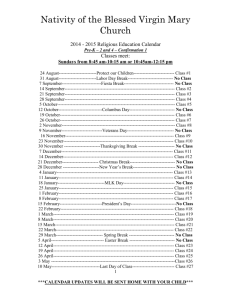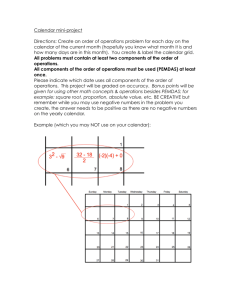Commodity Corner 3rd 2015
advertisement
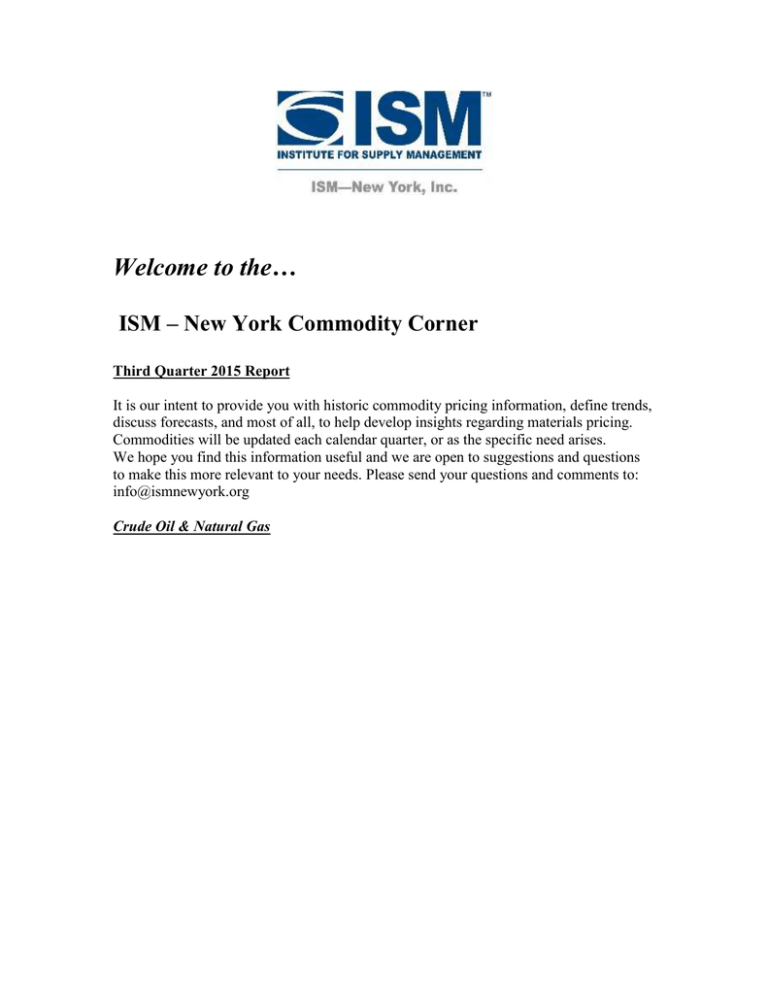
Welcome to the… ISM – New York Commodity Corner Third Quarter 2015 Report It is our intent to provide you with historic commodity pricing information, define trends, discuss forecasts, and most of all, to help develop insights regarding materials pricing. Commodities will be updated each calendar quarter, or as the specific need arises. We hope you find this information useful and we are open to suggestions and questions to make this more relevant to your needs. Please send your questions and comments to: info@ismnewyork.org Crude Oil & Natural Gas 15.00 150.00 145.00 140.00 135.00 130.00 125.00 120.00 115.00 110.00 105.00 100.00 95.00 90.00 85.00 80.00 75.00 70.00 65.00 60.00 55.00 50.00 45.00 40.00 35.00 30.00 25.00 20.00 15.00 10.00 Natural Gas ($ / MM BTU) 13.00 11.00 9.00 7.00 5.00 3.00 Jan-98 Jul-98 Jan-99 Jul-99 Jan-00 Jul-00 Jan-01 Jul-01 Jan-02 Jul-02 Jan-03 Jul-03 Jan-04 Jul-04 Jan-05 Jul-05 Jan-06 Jul-06 Jan-07 Jul-07 Jan-08 Jul-08 Jan-09 Jul-09 Jan-10 Jul-10 Jan-11 Jul-11 Jan-12 Jul-12 Jan-13 Jul-13 Jan-14 Jul-14 Jan-15 Jul-15 1.00 WTI ($ / barrel) West Texas Oil vs NYMEX Natural Gas ($ / MM btu) Natural Gas WTI Crude Oil – Cost Drivers: World-wide supply and demand balance, gasoline refining conditions in the US, regional/geopolitical instability and issues, commodity investment/speculation, global and local weather, OPEC statements and actions. Current Pricing Summary: 3Q2014 @ $97.26/bbl 2Q2015 @ $57.78/bbl 3Q2015 @ $46.69/bbl (a decrease of 19.2% from prior calendar quarter and a 52% decrease calendar period to period) FY2011 @ $94.54/bbl FY2012 @ $94.21/bbl FY2013 @ $98.01/bbl FY2014 @ $93.01/bbl Estimated FY 2015 @ $49.23/bbl (an estimated 47.1% year on year projected decrease) Natural Gas – Cost Drivers: Natural Gas is largely a domestic natural resource. Cost drivers are supply / demand, weather, and to some extent, sympathetic movement to oil, in particular given its recent volatility. Current Pricing Summary: 3Q2014 @ $4.07/MMBtu 2Q2015 @ $2.66/MMBtu 3Q2015 @ $2.76/MMBtu (an increase of 3.8% from prior calendar quarter and a 32.2% decrease calendar period to period) FY2011 @ $4.05/MMBtu FY2012 @ $2.79/MMBtu FY2013 @ $3.66/MMBtu FY2014 @ $4.44/MMBtu Estimated FY2015 @ $2.79/MMBtu (an estimated 37.2% year on year decrease) ISM - N.Y. Commodity Index 10.50 9.50 Index 8.50 7.50 6.50 5.50 4.50 3.50 2.50 1.50 0.50 Linerboard HDPE Edible Tallow Crude Oil Ethylene PET Ethylene Where Used: About 70% of North America’s ethylene production is derived from natural gas (30% from crude oil). Ethylene is the building block for a variety of the plastics we use daily, as well as solvents, surfactants, and other significant chemical feedstocks. Cost Drivers: Although tied to natural gas and oil costs, ethylene is also subject to supply / demand swings, and in particular to the operating efficiency of the production facilities. Downstream end products (plastics, solvents, glycols, etc) can compete for the available pounds of ethylene, thus driving ethylene pricing. Current Summary: 3Q2014 @ $.518/lb 2Q2015 @ $.342/lb 3Q2015 @ $.303/lb (an 11.4% decrease from prior calendar quarter and a 41.5% decrease calendar period to period) FY2011 @ $.543/lb FY2012 @ $.483/lb FY2013 @ $.467/lb FY2014 @ $.480/lb Estimated FY2015 @ $.322/lb (a projected 32.9% year on year decrease) Market trending upward slightly, due to seasonality of feedstock pricing and two crackers remaining down (and a third running at reduced rates – all taking supply out of the market) Market capacity to increase sharply in the 2017-2018 timeframe, with 8 crackers coming on line (7 new and 1 restart) HDPE Where Used: High density polyethylene is used in a wide variety of applications, including plastic milk containers, liquid detergent bottles, etc., and industrial applications such as plastic pipe for natural gas transmission and many automotive parts. Cost Drivers: High density polyethylene is heavily influenced by the factors driving ethylene costs, and it also has its own supply / demand cost influences. Current Summary: 3Q2014 @ $.865/lb 2Q2015 @ $.758/lb 3Q2015 @ $.728/lb (a 4% decrease from prior calendar quarter and a 15.8% decrease calendar period to period) FY2011 @ $.708/lb FY2012 @ $.688/lb FY2013 @ $.77/lb FY2014 @ $.853/lb Estimated FY2015 @ $.728/lb (a projected 14.7% decrease year on year) HDPE demand for the first 3 quarters of 2015 running 5.6% above the same period in 2014 HDPE exports are running 39% ahead of last year, on a year to date basis HDPE days of inventory down by 2 full days, to 29.5 at September close, driven by the strong export market (domestic demand is basically ‘flat”) Industry operating rate running at 92.6%, vs. 86.5% for the same period last year PET Where Used: This is the plastic used to make soda bottles, water bottles and plastic beer bottles, and is also used in the manufacture of carpeting and clothing. Cost Drivers: PET pricing is tied to ethylene glycol and to xylene markets, supply / demand balances, and it has historically had a seasonal influence (increased consumption during the summer due to water and soda bottle demand). Current Summary: 3Q2014 @ $.822/lb 2Q2015 @ $.703/lb 3Q2015 @ $.679/lb (a 3.4% decrease from prior calendar quarter and 17.4% decrease calendar period to period) FY2011 @ $.961/lb FY2012 @ $.906/lb FY2013 @ $.876/lb FY2014 @ $.79/lb Estimated FY2015 @ $.658/lb (a projected 16.7% year on year decrease) Historically, this summary has been based on the “mid-size” buyer price index, which has been discontinued in favor of a new “large buyer” formula and market based index Preliminary anti-dumping decision for imported PET announced in favor of U.S. producers. This action “could” lead to higher priced imports, however, with new capacity coming on line next year, it may be an offset; it is estimated that contract margins will stay about “flat” relative to raw material/feedstock changes Glycerine Where Used: Glycerine is used in cosmetics, foods, pharmaceuticals, and a variety of personal care and oral care products, as well as in other applications including animal feed, antifreeze and certain energy uses. Cost Drivers: As glycerine is a byproduct of the production of other products, its cost is principally driven by the demand for glycerine for its various uses – the supply remains driven largely by the production of other products such as biodiesel fuels, soaps, fatty alcohols, and fatty acids. Over the past few years the increasing use of biodiesel as a fuel in Europe, and increasing volumes in North America, has resulted in significant increases in the supply of byproduct glycerine globally, which will help drive the glycerine markets. Current Summary: USA 99.7% Kosher quality glycerine spot pricing: Sept 2015 @ $.45/lb End 2015 estimated at $.48/lb. Europe 99.7% Kosher quality glycerine spot pricing: Sept 2015 @ EUR 650/pmt End 2015 estimated at EUR 600/pmt USA 99.5% technical grade glycerine spot price: Sept 2015 @ $.35/lb End 2015 estimated at $.34/lb. Europe 99.5% technical grade glycerine spot price: Sept 2015 @ EUR 600/pmt End 2015 estimated at EUR 530/pmt. USA 80% crude glycerine spot price for refining: Sept 2015 @ $.10/lb End 2015 estimated at $.12/lb. Europe 80% crude glycerine spot price for refining: Sept 2015 @ EUR 330/pmt End 2015 estimated at EUR 275/pmt Estimates based on 1 Euro Dollar = $1.12 US Pricing has remained globally stable (flat) in line with the expectation of a “balanced” market Linerboard Where Used: Linerboard is the main component and cost driver in the manufacture of corrugated shipping containers, which are used in a broad variety of consumer industries such as food and beverage, as well as the automotive industry. Cost Drivers: Linerboard is heavily influenced by supply / demand balances, inventories, conversion cost (energy), exports and industry consolidation. Current Summary: 3Q2014 @ $770/tn list price 2Q2015 @ $770/tn list price 3Q2015 @ $770/tn list price (flat from prior calendar quarter and from calendar period to period) FY2011 @ $670/tn list price FY2012 @ $687/tn list price FY2013 @ $758/tn list price FY2014 @ $770/tn list price Estimated FY2015 @ $770/tn list price (flat year on year) Cumulative shipments for the first 9 months of the year were 1.3% ahead of year ago levels Full year shipments estimated to be about 0.9% higher than 2014 Growth in the market is estimated at 1.8% for 2016, and then slowing to 1.0% for 2017 Operating rates estimated at 95% for 2015, 94% for 2016 and 93% for 2017
